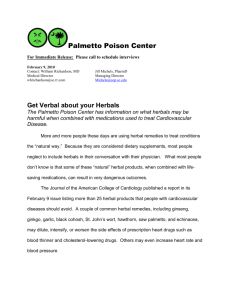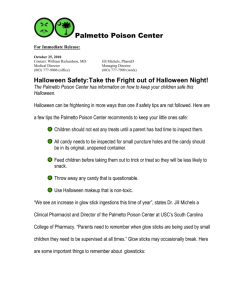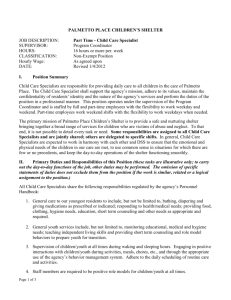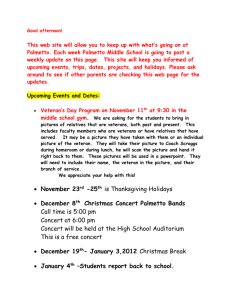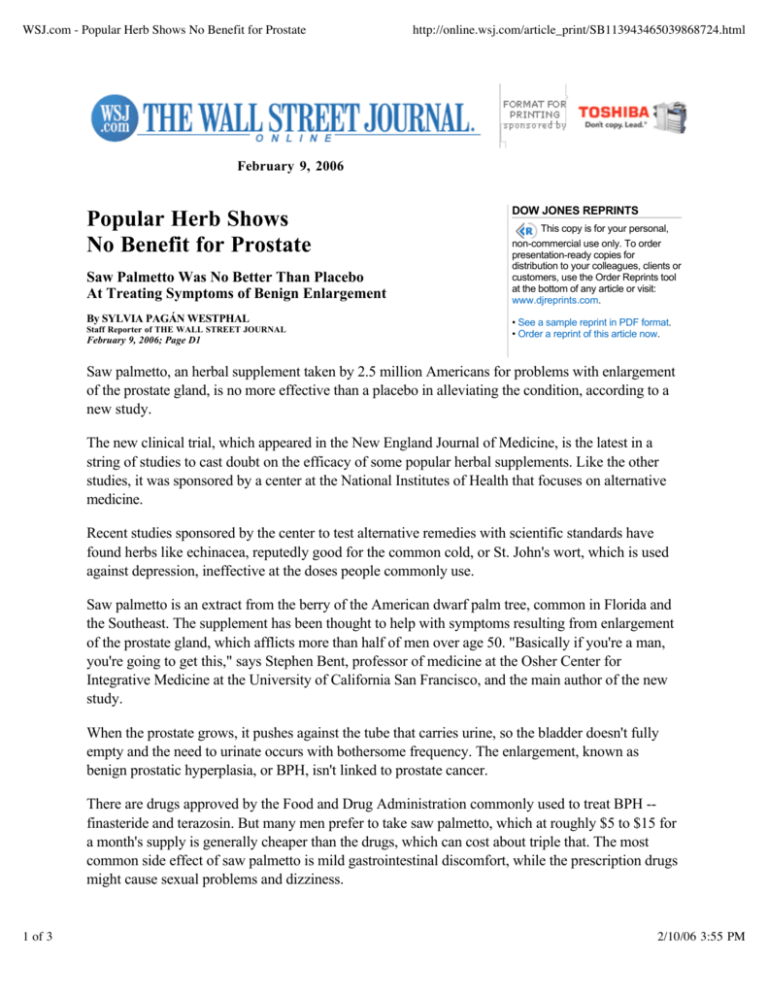
WSJ.com - Popular Herb Shows No Benefit for Prostate
http://online.wsj.com/article_print/SB113943465039868724.html
February 9, 2006
Popular Herb Shows
No Benefit for Prostate
Saw Palmetto Was No Better Than Placebo
At Treating Symptoms of Benign Enlargement
By SYLVIA PAGÁN WESTPHAL
Staff Reporter of THE WALL STREET JOURNAL
February 9, 2006; Page D1
DOW JONES REPRINTS
This copy is for your personal,
non-commercial use only. To order
presentation-ready copies for
distribution to your colleagues, clients or
customers, use the Order Reprints tool
at the bottom of any article or visit:
www.djreprints.com.
• See a sample reprint in PDF format.
• Order a reprint of this article now.
Saw palmetto, an herbal supplement taken by 2.5 million Americans for problems with enlargement
of the prostate gland, is no more effective than a placebo in alleviating the condition, according to a
new study.
The new clinical trial, which appeared in the New England Journal of Medicine, is the latest in a
string of studies to cast doubt on the efficacy of some popular herbal supplements. Like the other
studies, it was sponsored by a center at the National Institutes of Health that focuses on alternative
medicine.
Recent studies sponsored by the center to test alternative remedies with scientific standards have
found herbs like echinacea, reputedly good for the common cold, or St. John's wort, which is used
against depression, ineffective at the doses people commonly use.
Saw palmetto is an extract from the berry of the American dwarf palm tree, common in Florida and
the Southeast. The supplement has been thought to help with symptoms resulting from enlargement
of the prostate gland, which afflicts more than half of men over age 50. "Basically if you're a man,
you're going to get this," says Stephen Bent, professor of medicine at the Osher Center for
Integrative Medicine at the University of California San Francisco, and the main author of the new
study.
When the prostate grows, it pushes against the tube that carries urine, so the bladder doesn't fully
empty and the need to urinate occurs with bothersome frequency. The enlargement, known as
benign prostatic hyperplasia, or BPH, isn't linked to prostate cancer.
There are drugs approved by the Food and Drug Administration commonly used to treat BPH -finasteride and terazosin. But many men prefer to take saw palmetto, which at roughly $5 to $15 for
a month's supply is generally cheaper than the drugs, which can cost about triple that. The most
common side effect of saw palmetto is mild gastrointestinal discomfort, while the prescription drugs
might cause sexual problems and dizziness.
1 of 3
2/10/06 3:55 PM
WSJ.com - Popular Herb Shows No Benefit for Prostate
http://online.wsj.com/article_print/SB113943465039868724.html
Saw palmetto is the third-highest-selling herbal supplement in the U.S. (after garlic and echinacea)
with annual sales of $100 million to $120 million, according to the American Botanical Council, an
educational organization focusing on the science-based use of herbs.
The perception that saw palmetto works had been supported by a number of clinical trials over the
years. A comprehensive 2002 analysis of 21 trials involving over 3,000 men found that the studies
credited saw palmetto with providing "mild to moderate improvement" in symptoms with fewer
adverse events than finasteride. The multistudy analysis was performed by the Cochrane
Collaboration, a nonprofit group that specializes in reviewing medical literature.
However, Dr. Bent says many of the previous studies came with caveats. Some didn't treat patients
for long enough, and many didn't use a now-standard scoring system to evaluate symptoms. Saw
palmetto is bitter-tasting and has a foul smell, so patients may have been aware of whether they were
taking the supplement or a placebo -- the inactive, unmedicated preparation used in trials for
comparison purposes. The most reliable medical trials make sure that subjects are blind to what they
are taking so the knowledge can't affect their responses.
In the new study, Dr. Bent's team matched the appearance and taste of the placebo capsules to the
ones with saw palmetto. The trial involved 225 men over age 49 with moderate to severe BPH, who
were randomly assigned to either the saw palmetto or a placebo. The dose of saw palmetto -- 160
milligrams twice daily -- was similar to that of prior studies. Neither the patients nor the doctors
knew who was getting what.
Patients took the capsules for a year. Symptoms were assessed through a questionnaire and by
measuring of the size of the prostate gland and the volume of urine left, as well as other tests. The
study found no significant difference between the placebo and the saw palmetto group.
According to Dr. Bent, because of the previous evidence favoring saw palmetto, the study shouldn't
be considered definitive. However, the evidence now "shifts more towards uncertainty," he says.
Stephen Straus, director of the NIH alternative-medicine center, says that another study looking into
whether a higher does of saw palmetto works is being developed. "Our goal is not to debunk
things," he says, adding that the center's aim is to "provide the terrain" from which the right
questions about efficacy can be asked.
Edward Croom, consultant to Indena USA, the manufacturer providing saw palmetto for the study,
says that many of the prior studies had looked at men with mild to moderate BPH, and since this
study included men classified as having a "moderate to severe" form of the disease, it remains
possible that men with mild symptoms could see a benefit.
Dr. Croom, who characterized the study as "excellent" and "well done," says he started using saw
palmetto about five years ago when he started having to urinate two and three times in the middle of
the night. Now, says the 57-year-old, he has "no need to get up at all."
Gregory Zaino, chief executive of Saw Palmetto Berries Co-op Inc., a large manufacturer based in
2 of 3
2/10/06 3:55 PM
WSJ.com - Popular Herb Shows No Benefit for Prostate
http://online.wsj.com/article_print/SB113943465039868724.html
Naples, Fla., remains skeptical of the findings. "I talked to thousands of guys who take [saw
palmetto] and they said it helped them," he says. Mr. Zaino says his company, which supplies the
extract to numerous manufacturers, sells close to $6 million a year.
Dr. Bent says it's quite possible that people who take saw palmetto indeed derive a benefit due to a
placebo effect -- the psychological lift that comes from believing you are getting medicine. "In many
ways, that's not such a bad thing," he says.
Write to Sylvia Pagán Westphal at sylvia.westphal@wsj.com1
URL for this article:
http://online.wsj.com/article/SB113943465039868724.html
Hyperlinks in this Article:
(1) mailto:sylvia.westphal@wsj.com
Copyright 2006 Dow Jones & Company, Inc. All Rights Reserved
This copy is for your personal, non-commercial use only. Distribution and use of this material are governed by our
Subscriber Agreement and by copyright law. For non-personal use or to order multiple copies, please contact Dow Jones Reprints
at 1-800-843-0008 or visit www.djreprints.com.
3 of 3
2/10/06 3:55 PM



